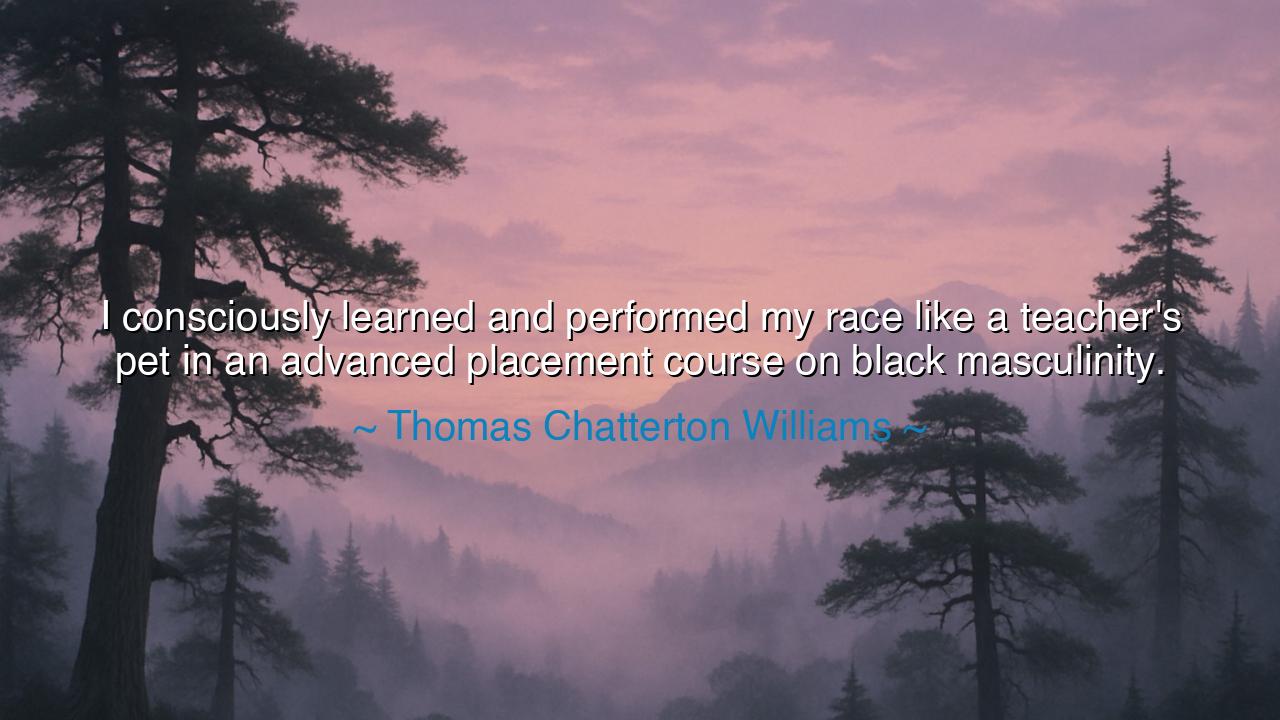
I consciously learned and performed my race like a teacher's pet
I consciously learned and performed my race like a teacher's pet in an advanced placement course on black masculinity.






"I consciously learned and performed my race like a teacher's pet in an advanced placement course on black masculinity." Thus spoke Thomas Chatterton Williams, thinker and essayist, whose life and writings wrestle with the weight of identity and the performance of self. His words ring with both irony and pain, for they expose the truth that race is often not merely lived, but performed, like a lesson learned under the eyes of society, with approval and disapproval marking every gesture. In his image of the teacher’s pet, he lays bare the desire for validation, for belonging, for mastery of rules not chosen but imposed.
The ancients would have known this burden well, though under different names. The Roman citizen and the foreigner in the empire; the noble and the serf in medieval kingdoms; the Brahmin and the untouchable in India—all were not only who they were, but what the world told them they must be. Many learned to perform their identities, not always out of love for the mask, but out of necessity. So too did Williams, who admits he consciously learned the expectations of black masculinity, rehearsing them like a subject in school, striving to excel in a role already written.
The phrase "advanced placement" carries its own sting. It suggests that this performance was not casual, not passive, but studied and perfected. He sought to embody the ideals of strength, toughness, resilience—those traits often demanded of black men by both their own communities and the outside world. Yet in doing so, he reveals the paradox: to live authentically, he was compelled to act, to perform a script, to become both actor and student in the same drama. It is a confession of both mastery and constraint, triumph and entrapment.
History offers us mirrors of this struggle. Think of Frederick Douglass, who once said that learning to read was like seeing the chains of slavery more clearly. In gaining mastery over language, he learned not only to express himself but also to confront the false roles society had written for him. Or recall W.E.B. Du Bois, who spoke of "double-consciousness," the feeling of always looking at oneself through the eyes of others, of living a life half one’s own and half a performance for the dominant gaze. Williams’s words are a modern echo of this same cry.
The lesson is profound: identity is not merely inherited, it is constructed, sometimes consciously, sometimes by force. To be told "what" one is, and to learn how to embody it so as to survive, is both a form of education and a kind of imprisonment. Yet in confessing this, Williams also illuminates a path toward freedom. For in recognizing that the self can be performed, we also see that it can be reshaped, rewritten, and reclaimed. What begins as a performance for others can, through awareness, become a performance for the self—an act of liberation.
O children of tomorrow, hear this: you are not bound to play forever the roles the world assigns you. Yes, you may learn them, as Williams did, you may perform them for a season, but you may also step beyond them. You may create new definitions, new ways of being that honor your truth more than society’s script. The performance is not destiny; it can be transformed into authorship.
Therefore, reflect on the roles you have unconsciously performed. Ask yourself: who am I when no one is watching? What masks do I wear to please, to survive, to excel? And which of these may I now lay down? Do not despise the masks, for they served you once, but do not cling to them when they no longer serve. Instead, move toward freedom—the freedom to live not as a teacher’s pet in someone else’s classroom, but as a creator of your own curriculum of life.
Thus the teaching of Thomas Chatterton Williams endures: identity is a performance we often learn to survive, but in naming it, we gain the power to choose differently. Walk, then, not merely as actor, but as author of your own story, and let your truth be greater than the lessons the world has forced upon you.






AAdministratorAdministrator
Welcome, honored guests. Please leave a comment, we will respond soon